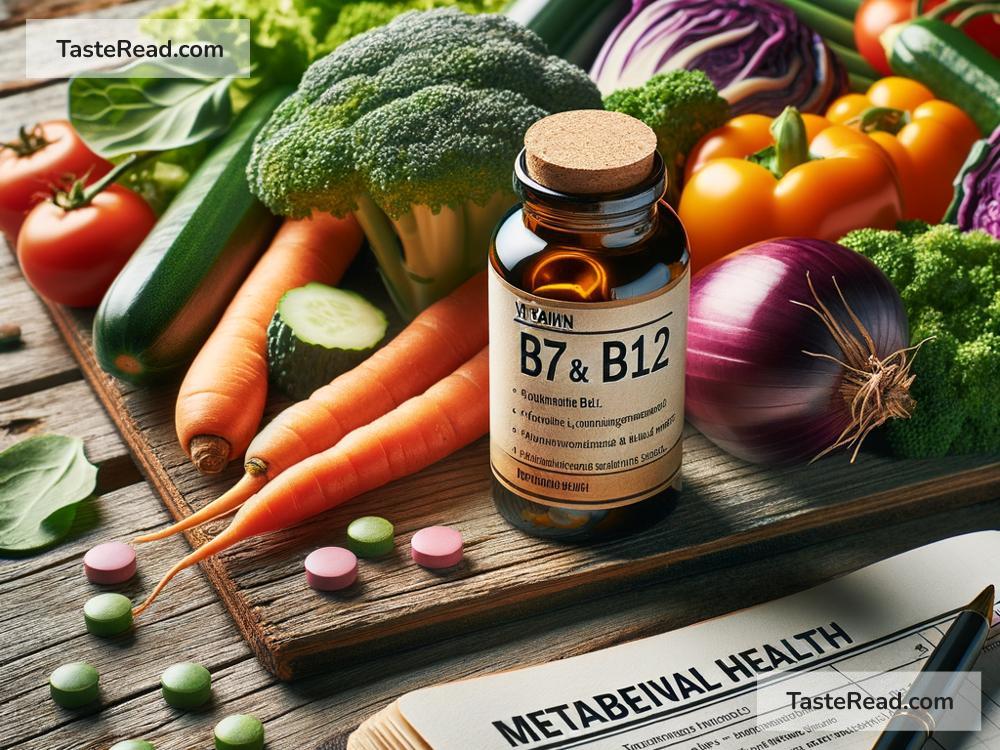Sure, here’s a simplified blog article on the topic:
The Role of Vitamin B12 in Metabolic Health
When it comes to staying healthy, vitamins play an important role in keeping our body systems working smoothly. One essential vitamin, Vitamin B12, often flies under the radar, but it’s a key player in maintaining your metabolic health. If you’ve ever wondered why this vitamin matters or how it affects your body, you’re in the right place! In this blog, we’ll walk you through the basics of Vitamin B12 and its impact on your metabolism in easy-to-understand terms.
What Is Vitamin B12?
Vitamin B12 is a water-soluble vitamin, meaning your body doesn’t store it for long periods. It’s part of the B-complex group of vitamins, which are known for helping your body produce energy. Vitamin B12 is mostly found in animal-based foods like meat, fish, eggs, and dairy, so people who follow vegetarian or vegan diets often need to pay extra attention to their intake.
Why Is Metabolism Important?
Metabolism is the process where your body converts food into energy. This energy is what allows you to move, think, and even breathe! Your metabolism relies on enzymes and nutrients, including vitamins like B12, to function efficiently. When your metabolism is working properly, your body can maintain healthy energy levels, repair itself, and fight off illnesses.
How Does Vitamin B12 Help With Metabolic Health?
Vitamin B12 plays several critical roles in your metabolism. Let’s break them down:
1. Energy Production
When you eat food, your body breaks it down into smaller components like carbohydrates, proteins, and fats. Vitamin B12 helps convert these nutrients into usable energy. Specifically, B12 works with other B vitamins to break down glucose, which is the body’s primary energy source.
Without enough Vitamin B12, your body might struggle to produce energy efficiently. That’s one reason why fatigue is a common symptom of B12 deficiency.
2. Red Blood Cell Formation
Red blood cells carry oxygen from your lungs to the rest of your body. Vitamin B12 is crucial for producing healthy red blood cells. When you don’t have enough B12, your red blood cells can become abnormally large and unable to carry oxygen properly. This condition is called megaloblastic anemia.
Oxygen is essential for energy production in your cells, so a lack of healthy red blood cells can slow down your metabolism and leave you feeling tired and weak.
3. Supporting Nerve Function
Your nervous system also relies on B12. The vitamin helps maintain the protective coating around your nerves, called the myelin sheath. This coating allows electrical signals to travel quickly and efficiently between your brain and the rest of your body.
When your nerve function is disrupted due to a lack of B12, it can lead to symptoms like tingling, numbness, or difficulty with movement. This can affect your body’s ability to regulate metabolic processes.
4. DNA Synthesis
Vitamin B12 is involved in DNA synthesis, which is essential for repairing and building new cells. Your body is constantly replacing old cells with new ones, especially in organs that are responsible for digestion and energy production. Without proper cell repair, your metabolism can slow down over time.
Signs of Vitamin B12 Deficiency
A deficiency in Vitamin B12 can impact your metabolic health and cause a range of symptoms, including:
- Fatigue or weakness
- Difficulty concentrating or memory problems
- Paleness or jaundiced skin
- Tingling or numbness in the hands and feet
- Mood changes or depression
- Digestive issues like diarrhea or constipation
If you notice any of these symptoms, it’s a good idea to consult your doctor. They might check your B12 levels through a blood test.
Who Is at Risk for Vitamin B12 Deficiency?
Some groups of people are at higher risk of developing a B12 deficiency:
- Vegetarians and Vegans: Since B12 is mostly found in animal products, those following plant-based diets may not get enough of this vitamin from food alone.
- Older Adults: As we age, our bodies produce less stomach acid, which is needed to absorb B12 from food.
- People With Digestive Issues: Conditions like Crohn’s disease, celiac disease, or certain surgeries can interfere with B12 absorption.
- Those Taking Certain Medications: Drugs like antacids or diabetes medications can reduce B12 absorption.
Supplementing with B12 or eating fortified foods can help these individuals maintain healthy levels.
How Can You Get Enough Vitamin B12?
Maintaining healthy Vitamin B12 levels is straightforward for most people:
- Eat B12-Rich Foods: Include animal-based foods like meat, fish, eggs, and dairy in your diet. If you’re vegetarian or vegan, look for fortified cereals, plant-based milks, or nutritional yeast.
- Take Supplements: Vitamin B12 supplements are widely available and often recommended for people at risk of deficiency.
- Injections or Prescription Treatments: In severe cases, doctors may prescribe B12 injections or high-dose supplements.
The recommended daily amount of B12 for most adults is 2.4 micrograms, but your needs might vary based on health conditions or life stage.
Final Thoughts
Vitamin B12 is a small but mighty nutrient that plays a big role in keeping your metabolism healthy. It helps your body produce energy, form red blood cells, support nerve health, and repair DNA. Without enough B12, your metabolism can slow down, leading to fatigue, weakness, and other health issues.
If you think you might be at risk for a B12 deficiency, talk to your doctor about testing your levels and finding the best way to boost your intake. Your metabolic health—and overall well-being—will thank you for it!
Hope you find this helpful! Let me know if you’d like to explore more topics.

